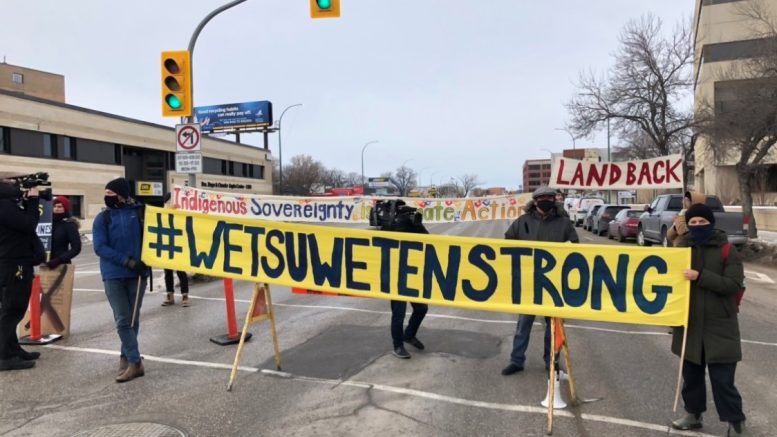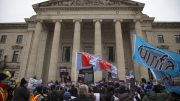Demonstrators blocked the intersection near the RCMP D Division Headquarters and Portage and Main before marching down Portage toward the Manitoba legislative building. The demonstrations were protesting in response to the arrests of land defenders at the Gidimt’en checkpoint on Nov. 18 and 19 amidst British Columbia’s state of emergency.
As part of their efforts to oppose the CGL pipeline, Wet’suwet’en land defenders and solidarity protesters have established blockades to prevent drilling under the Morice River in Gidimt’en clan territory in northwest B.C.
Nearby streams and waterways have already been contaminated by CGL-related projects.
Clayton Thomas-Müller, a Cree filmmaker and activist, said Friday’s rallies were answering a “call to action” in response to the arrests.
“We’re here today in Treaty 1 territory in front of the Royal Canadian Mounted Police headquarters blocking traffic, stopping business as usual to send a message that […] citizens are concerned about the safety of Wet’suwet’en people,” he said.
“The fact that they brought canine units and semi-automatic rifles and helicopters into encampments where there are unarmed women and children and elders [is] just ridiculously excessive. There’s absolutely no need for that kind of show of force. The Wet’suwet’en have been completely peaceful […] This kind of disproportionate show of force would not be tolerated here in southern Canada but because it’s such an isolated region […] they thought they could just go in there and do what they do, but Canada is watching.”
Last week, in the RCMP’s third raid on the encampment, 29 people — including two journalists — were arrested over two days as police in B.C. cleared a service road blockaded by land defenders opposed to CGL’s construction.
RCMP conducted the raid in military gear, assisted by canine units and assault weapons.
Fellow demonstrator Allegra Friesen Epp thinks since the Wet’suwet’en have not granted access to their unceded land, the RCMP’s very presence there constitutes excessive force.
“I don’t care if the arrests themselves are peaceful, it’s the violation of Wet’suwet’en law and Indigenous rights that is inherently violent,” Friesen Epp said.
B.C. mudslides provide “good cover” for arrests
The arrests come as B.C. declared a state of emergency in response to flooding and mudslides caused by record-breaking rainfalls that have left hundreds stranded without essential services.
Thomas-Müller argued the federal and B.C. provincial governments are taking advantage of the climate-induced state of emergency and using them as cover for the arrests.
“This is straight out of the settler-colonial dirty tactics playbook,” he said.
According to RCMP, protesters blocked traffic near the RCMP station for approximately an hour.
“I think that people who are upset about minor delays in their traffic today should be thinking about the delays in traffic that British Columbian citizens are facing because all the highways and trains have been washed out by a mega climate storm,” said Thomas-Müller.
The blockade of the Portage and Main intersection and the subsequent march was led by Anishinaabe activist Sadie-Phoenix Lavoie and Miyawata Stout, who is Cree.
“There will be no fourth raid on Wet’suwet’en land,” Stout told the crowd.
“This is the end.”
Stout agreed with Thomas-Müller that the climate crisis provides “good cover” for the arrests.
“It’s […] just incredibly disturbing that during a climate emergency, Indigenous land defenders who are mitigating the climate crisis are being criminalized,” Stout said.
After speeches by Lavoie and Stout, the crowd marched down Portage Avenue toward the legislature.




